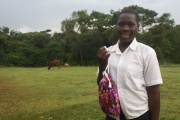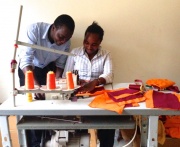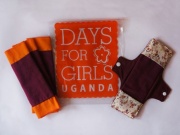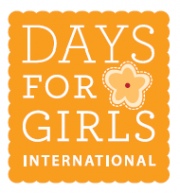Locally made washable pads - Promotion days for girls from Uganda
Country: Uganda
Contents
[hide]Uganda: Promotion of locally made washable pads - Promotion story from Uganda
Basic data:
Pilot program in Uganda targeting MHM through local fabrication of washable pads. the distribution of menstrual hygiene kits and health education. Another aim is to generate income for women through starting small businesses. In 2014, Days for Girls launched an exciting partnership with the Dutch development organization, SNV Uganda, to reach 30,000 girls in 4 different districts through school-based training programs.
The project and the experiences:
“One day I was sitting in class and felt something wet pass through my skirt. I lived with only my brother and no one had ever told me about periods. I felt scared.” Sharon Nakalinda’s story is not unique in Uganda, where the topic of menstruation remains taboo and many girls and women lack the finances or financial decision-making power to purchase pads.
While there has been an increasing amount of attention given to the issue of menstrual hygiene in the past few years from international organizations and government bodies, there are still many challenges ahead. As of 2014, 1 in 10 girls in sub-Saharan Africa – and 60% of Ugandan girls – missed at least a day of school each month due to menstruation. Girls and women are lacking sufficient information, appropriate strategies, and affordable access to resources in order to effectively manage their menstruation.
Days for Girls International, a non-profit organization, is working with local partners in countries around the world to help close those gaps and provide women and girls with a holistic, sustainable, and locally-appropriate approach to menstrual hygiene management. Days for Girls has been developing and piloting a program in Uganda to test a model that incorporates educational training programs, sewing of washable menstrual hygiene kits, and entrepreneurial skills development.
Days for Girls uses a three-pronged approach to address menstrual hygiene challenges in Uganda– and believes this model can be readily adapted to different cultural and economic contexts around the world.
The first component of the model seeks to create a supply chain of high-quality, long-lasting washable menstrual hygiene kits. The kits are made with materials that are sourced from within East Africa in an effort to support local markets and businesses. The design is based on years of testing and feedback from girls and women around the world. Each kit contains a cotton shield, shaped like a traditional pad with “wings” and clips into the underwear. The shield has two pockets at either end to hold the flannel liner, which acts as the soft and absorbent pad piece. The liner uses a tri-fold design that maximizes absorbency when folded, yet allows for quick drying and a discreet “handkerchief” look when unfolded.
While these kits provide an environmentally friendly and economical solution, there is still the issue of sensitization and education surrounding menstruation and reproductive health. This is where the second component of the program comes in: Days for Girls works with primary and secondary schools to run educational training programs that teach basic reproductive health topics and allow the girls to try making their own kit. In 2014, Days for Girls launched an exciting partnership with the Dutch development organization, SNV Uganda, to reach 30,000 girls in 4 different districts through school-based training programs.
The last component of the program helps to create potential linkages between the product and the target end-users, and is supported by the awareness created through the educational programs. This third component involves working with low-income women in semi-urban and rural communities to act as Days for Girls ambassadors. The women are trained with entrepreneurial skills including marketing, budgeting, and business planning, and they are given the tools and resources needed to start their own Days for Girls Enterprise. Eunice, of Pallisa district, has already felt the impact of this program with the launch of her own Days for Girls Enterprise. She says, “I am now able to save something with the money I get from these kits. To date, I have sold 30 kits to some nearby schools.”
Through these enterprises, the women receive continued support and mentorship from Days for Girls, and they are provided with access to a set of low-cost menstrual hygiene solutions including Days for Girls kits, a locally made biodegradable disposable pad called “Makapads” from our partners at Technology 4 Tomorrow, and menstrual cups through our partner, Ruby Cup. They are also supported to host small community events to continue sparking discussion and education on menstrual hygiene and health.
These three programs work together to generate awareness and discussion around menstrual hygiene and reproductive health, and also serve to provide necessary access points into markets that are otherwise difficult to reach. And what does that mean for a student like Sharon? It means the potential for better attendance rates in school, improved hygiene, and more self-confidence. Sharon has been using her Days for Girls kit and sharing the information with her friends. She says, “I’m happy now that I know about the reusable pad.” Because health, hygiene and happiness go together!
The key lessons of the story: Locally made washable pads help girls to manage their menstruation and can create income generation for women.
Sustainability Criteria
Health and Hygiene: Days for Girls menstrual hygiene kits are a safe and reliable alternative to many unhygienic menstrual solutions being utilized by girls in low-income settings, such as old cloths, newspaper and banana leaves.
Environment and natural resources: Using menstrual hygiene kits eliminates the need for disposable products. Materials are sourced locally and do not have a substantial carbon emissions impact like imported goods.
Technology and operation: The Days for Girls kit uses a unique design: pockets in the shield component prevent slippage and the liner does not look like a traditional pad, allowing girls to hang them to dry discretely.
Financial and economic issues: Girls/women are supported to start own enterprises selling kits in their communities. The kit itself helps girls/women to save money, as they do not need to buy disposable products each month.
Socio-cultural and institutional aspects: The Days for Girls model is refined and adapted to each specific setting to ensure that the program being built is appropriate, and will be long lasting.
Project details
Type of project: Program to test a model that incorporates educational training programs, sewing of washable menstrual hygiene kits, and entrepreneurial skills development
Project period: 2013, ongoing
Project scale: 4 staff, 18 sewing contractors, scaling a proven approach
Financial support: The Uganda project generates ~ 50% of its monthly budget with income from in-country sales & programs. The remaining 50% is funded by Days for Girls International.
Days for Girls is a non-profit organization dedicated to restoring days of dignity, days of school, days of work, and days of health by providing an holistic approach to menstrual hygiene management. Days for Girls has over 300 volunteer chapters around the world and operates a full-time country program in Uganda.
Contact
Libby Daghlian
Days for Girls
libby![]() daysforgirls.org
daysforgirls.org
Uganda![]() daysforgirls.org
daysforgirls.org




